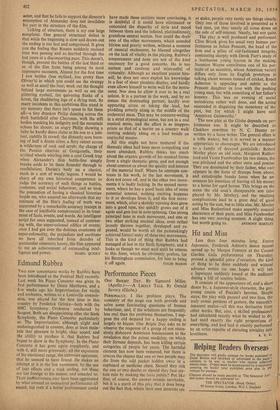Performance Pieces
ONE BRIGHT DAY. By Sigmund Miller. (Apollo.)—A LIKELY TALE. By Gerald Savory. (Globe.) , PERSONALLY, I like problem plays. The casuistry of the stage can both provide and solve some fascinating questions of human behaviour, and, if the solutions are frequently less real than the problems themselves, I sup- pose the old demand for a happy ending is largely to blame. One Bright Day asks us to observe the response of a group of not exces- sively dishonest American businessmen to the revelation that the patent medicine, on which their fortune depends, has been killing certain categories of people for years. The harmful element has now been removed, but there is always the chance that one or two people may die from the odd packet hidden away in a clipboard or medicine chest. Should they risk the one or two deaths or should they face cer- tain ruin by making the facts public? Put like that, of course, the answer sounds inevitable, but it is a merit of this play that it does bring out the fact that, where their own interests arc at stake, people very rarely see things clearly. Only one of those involved is presented as a bad man, yet they nearly all come down on the side of self-interest. Nearly, but not quite. The play is well produced and performed. Clive Brook gives his usual very human per- formance as Julian Prescott, the head of the firm and a pillar of old-fashioned integrity, contrasting sharply with Derek Farr's study of a loathsome young tycoon in the making. Naunton Wayne contributes one of his por- traits of an eccentric, whose American variety differs only from its English prototype in talking about women instead of cricket. Renee Asherton is appealing and subtle as the Prescott daughter in love with the pushing young man, but with something of her father's honesty. This Was an evening of social melodraMa rather well done, and the acting succeeded in disguising the monotony of the plot, but for which I might have said 'American Galsworthy.' The new play at the Globe depends on per- formance too. It might be described as Chekhov rewritten by N. C. Hunter re- written by a farce writer. The general effect is a trifle watery, but it is served in a manner appropriate to champagne. We are introduced to a family of decayed gentlefolk: Robert Morley plays an old soak; Margaret Ruther- ford and Violet Farebrother his two sisters, the one pixilated and the other stern and precise. ' They arc dominated by their father, who only appears in the form of thumps from above, and catastrophe breaks loose when he an- nounces his intention of leaving all his money to a home for aged borses. This brings on the scene the old soak's disreputable son (also played by Mr. Morley), and the resulting complications lead to a great deal of good acting by the cast, but to little else. Mr. Morley and Miss Rutherford make superbly comical characters of their parts, and Miss Farebrother has one very moving moment. A slight thing, but worth going to. ANTHONY HARTLEY


































 Previous page
Previous page